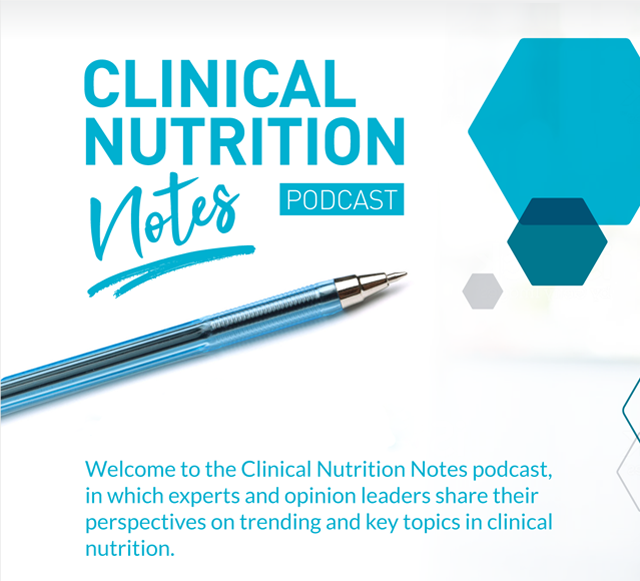

1.01/ Hyperglycemia in the ICU
17 Min. 59 Sec. | May 22, 2019
INTRO: Hello and welcome to Clinical Nutrition Notes – a podcast where we speak with guest experts and opinion leaders about the art and science of clinical nutrition – brought to you by Nestlé Health Science Canada. This podcast is intended for health care professionals, for education purposes.
I am your host, Bethany Hopkins, Medical Affairs Manager with Nestlé Health Science.
Today we'll be talking with Todd Rice M.D. about glucose management in the ICU and the evolving role of nutrition to help manage hyperglycemia and critical illness. Dr. Rice is an associate professor of medicine at Vanderbilt University in Nashville, Tennessee and Director of the Medical ICU and intensivist at Vanderbilt University Medical Center. As a physician scientist he conducts clinical research in the ICU and will be talking to us about one of the recent nutrition studies, for which he served as academic P.I.: the DIetary Management of Glucose VarIability iN thE ICU Trial, also known as a DIVINE Trial.
Hopkins: Thank you for joining us, Dr. Rice. To set the stage, I'd like you to start by having you talk to us about why you believe we should be concerned about glucose management in the ICU.
Rice: Over the last decade, maybe a little longer than the last decade, we've learned a number of things about blood sugars and glucose management in the ICU. First, we've learned that hyperglycemia, high blood sugars, poorly controlled blood sugars are all associated with higher severity of illness. So, that means that sicker patients have a harder time controlling their blood sugars. We also know from a lot of non-ICU and some ICU data that higher blood sugars have a lot of detrimental effects on the body, including making it difficult to fight infection, they increase inflammation, they can cause volume depletion with an osmotic diuresis in a number of different sort-of both kind of biochemical and physical complications of illness.
And so, hyperglycemia, with this association with sicker patients and with worse outcomes, is a disease state – is kind of what a nice way of describing it – that we can potentially treat and potentially improve the outcomes of our patients. The other side of it is that patients who have a hard time with controlling their blood sugars, and will have high blood sugars, also are more prone to get low blood sugars and hypoglycemia, and they do this, some on their own because of their critical illness, and then some of the things that we do to try and treat the hyperglycemia like, for example, give insulin, make them even more prone to have low blood sugars. And, not surprising to most people in the medical field, if you get hypoglycemia and low blood sugars – sugar is the fuel for your body, for all the tissues and cells in your body – and not having enough sugar and having low blood sugar puts you risk for things like stroke and organ damage and obviously much worse outcomes, including death.
So, both low and too high blood sugars are bad for you. They occur more commonly in critically ill patients and are more common in patients as they're sicker in the ICU. And thus, they're a key component that we're interested in - how does their variability and controlling them potentially improve the outcomes of our patients?
Hopkins: So, thinking about this concept then of what we can do to improve blood glucose management, you were involved as the academic P.I. in the DIetary Management of Glucose VarIability iN thE ICU Trial, also known as the DIVINE Trial, which was a nutrition trial that was recently completed across seven ICU sites in North America. And you've alluded to this already Dr. Rice, but can you tell us how this DIVINE Trial came about?
Rice:Yes, so this was a collaboration with seven academic medical centres in North America and Nestlé to study blood sugar control and blood sugar variability in critically ill patients and try and both better understand the variability and specifically non-insulin ways that we might be able to better control blood sugar. So, this study was actually an open-label, multi-centre, randomized trial of patients that were mechanically ventilated in ICUs. They had to be slightly overweight or obese, so they had to have a body mass index between 26 and 45. And then the goal was to enroll patients that were getting enteral nutrition and would be getting enteral nutrition for up to five days or longer.
Hopkins:Could you give us a brief overview of the results of the study?
Rice:And so what we did was we took those patients, we randomized them to a control group, which was a high protein formula, or what we called an experimental group, although the formula was not one that was specially made for this trial, but it was just a very high protein – 37 percent whey protein, so a slightly different composition of the protein – and low carbohydrate formula. And they got randomized to one of those two formulas with the goal to see how that affected their variability of their glucose and the amount of insulin that they would get overall. And then, as we do in all studies – although it wasn't powered to detect huge differences in clinical outcomes, we also looked at clinical outcomes.
So, this study actually showed that there were 105 patients total randomized from the seven centres: 53 to the control high-protein formula, 52 to the intervention formula, which was still high protein but was 37 percent whey instead of other protein composition, and a lower carbohydrate formula. And then of those 105 patients that were randomized, we had really nice glucose measurements and insulin administration in 102, which are what make the main analysis. And the results actually showed that the primary endpoint we were looking at was, did patients have more time of blood sugars between 110 and 150, and it improved the amount of time that patients spent in that sort of blood sugar range? And we didn't actually find that that was the case, but that was due to two things: one is that patients in the intervention arm had fewer blood sugars higher than that range – so it did actually lower blood sugars – but they actually had more blood sugars lower than that range, and lower than that range was not hypoglycemic, but it was actually in the normal range of 80 to 110 mg/dL or the normal blood sugar range. So, we didn't actually see a difference in that range of 110 to 150 or 6.1 to 8.3 mmol/L. But we did see more in 80 to 110 mg/dL or 4.4 to 6.1 mmol/L group and fewer in the greater than 150 mmol/L group or greater than 8.3.
And so overall, this experimental interventional formula that used a higher percent of whey protein and lower carbohydrates resulted in better blood sugar control, and potentially not surprising, it actually did it all in the face of getting less insulin administration. We also monitored the amount of insulin that was given in both of the groups, and the control group got more insulin than the intervention group despite the fact, or it in addition to the fact, that the intervention group had better blood sugars.
Hopkins:As you outlined, there were these improvements in blood glucose that were achieved with the trial and less insulin given to patients. As we know traditionally, insulin is used to manage blood glucose in the critical care setting. Does it matter in this setting if glucose is achieved with nutrition or insulin?
Rice: Yeah that's a great question. A question that I can hypothesize about, but we don't really know for sure. Insulin is a growth factor, so it has some other properties and effects in the body. Obviously nutritional support also has other effects besides blood sugar control in the body. So those kind of compete to see which of those may have more better effects in the body. But the thing that I get really concerned about is that insulin is a high-risk medication, and what that means is that it's highly prone to have severe adverse side effects. The biggest one being low blood sugar and hypoglycemia. And as the study showed, we actually had better blood sugar control without more hypoglycemia when we use this intervention with a higher whey protein, lower carbohydrate formula. And other studies have shown that when you try and do a similar thing with insulin you end up with considerably more hypoglycemia, and some post hoc analysis of those studies have shown that hypoglycemia appears to be the cause of worse outcomes in those patients.
So, I think you know insulin works to lower your blood sugar, but it also puts patients at an incredibly high risk for having low blood sugars, and low blood sugars are something that can be really harmful to the patients. So, my thought process on this is that if we can control the blood sugar with something like a different type of composition of formula, that that's going to ultimately result in better outcomes for our patients than using insulin, because of the high risk of adverse events from insulin administration.
Hopkins:Continuing with that, the different composition of the formula, you mentioned the formula’s high protein and low carbohydrate. In your opinion, the outcomes of the trial, do you think they were related to the fewer calories and carbohydrate patients received, or do you believe that there were other formula characteristics at play?
Rice:Unfortunately, because of the way the trial was designed, we don't have robust enough biomarker data to know for sure which of those is true. My take on these results and my understanding of these results leads me to believe that it's actually a little bit of both. That having administration of fewer carbohydrates and a lower carbohydrate load for the patient helps avoid some of the hyperglycemia in critically ill patients, that hyperglycemia is thought to be due to insulin resistance and decreased insulin sensitivity. And in those situations, giving additional sugar or carbohydrates, can raise your blood sugars. So, lowering the carbohydrates probably has some effect. But there also appears to be an effect of improving insulin resistance with this higher composition of whey protein, and so I think both improving the insulin resistance and giving fewer carbohydrates result in the more normal homeostasis of blood sugars that we saw in this trial, then we see in other critically ill patients.
Hopkins:Now for the last couple of questions. Given this, where do you see research going in this area of using nutrition to help manage metabolic outcomes in the ICU?
Rice: I think this is a key turning point in nutritional research in the ICU. What I mean by that is that traditionally up until this point we have largely been agnostic towards specific compositions of formulas, and we use special formulas for special patients like renal formula for a patient that has renal failure or maybe a liver formula for a patient with the hepatic failure. But largely we haven't paid a lot of attention to the type and amount of protein that's given, and we haven't paid a ton of attention to the amount of carbohydrates that are given. And I think those are key components of nutritional formulas, and I think besides just being an energy source I think they have effects within the body that may alter other mechanisms of homeostasis such as the whey protein altering insulin sensitivity. And so, I think going forward, instead of research about how many calories should we give, how much protein should we give, how much of the two together should we give, I think we need to be very aware and cognizant of what type of protein are we giving and what type and amount of carbohydrates are we giving versus lipids, versus other energy sources, in addition to just the total amount of energy in and calories in protein that’s given. I think it's very, very reasonable to make an assumption that the different types of protein, the different types of energy sources have different effects in the body and may very well result in different biomarkers/biochemical alterations and clinical outcomes
Hopkins:With all of this said, considering that part of your practice is as a clinician, as an intensivist in the ICU, how has this study and the work that you've done had an impact on your practice?
Rice: This is a pretty easy change to make in practice. The formulas that sort of mimic what we did in the study – high-protein, high-whey-protein formulas, lower carbohydrate formulas – are available commercially and they're just as easy to administer to critically ill patients as the higher carbohydrate, higher protein formula is. So, we've – not with all of our patients but with some of our patients – made a move towards preferentially giving them a higher whey composition formula, lower carbohydrate formula to try and improve both their blood sugars and their insulin sensitivity. And hopefully, although we don't have definitive results from this study, their clinical outcomes too. How we make changes in medicine is always at a glacial pace. We are warming that glacier and getting it to melt some so that it moves a little faster into doing these sorts of interventions, these nutrition interventions in our critically ill patients in my hospital.
Hopkins:This is exciting, although you say things may not move as quickly as sometimes you'd like to see, the role of enteral nutrition has been evolving in the metabolic management and outcomes of critically ill patients, and certainly research like the DIVINE Trial has demonstrated that there can be an impact of nutrition on real-world clinical practice. So, thank you for sharing that. Now before we sign off, I'd like to take a minute to ask you another question so our listeners can get to know you better. Can you tell us how you first became interested in the field of nutrition?
Rice: Yes, good question, kind of an interesting career path. I trained in internal medicine through residency then did a pulmonary and critical care fellowship. In my fellowship, we had lots of patients, and we were doing nutrition interventions in these patients. And being at a place that was very evidence based, we were trying to find evidence behind some of the interventions that we were doing and were really quite disappointed in the fact that there wasn't much evidence in support or in contrast to what we should be doing in nutrition support of the critically ill. And so, I was very curious as to how nutrition support affects my patients and how to optimize nutritional support and thus improve the outcomes of my patients. And it was a key area where it was a niche in the ICU that didn't have a ton of research at the time and was ripe for sort of studying it and better understanding the effects that nutrition support had on these critically ill patients. So, with that, and with guidance from a mentor who encouraged me to kind of tackle that, I got into some critical care nutrition research, got some funding, and sort of launched critical care nutrition research career based off that curiosity and interest.
Hopkins: Thank you so much for sharing your story with us. And on that note, Dr. Rice, we’ll conclude this podcast and I'd like to thank you for joining us and thank all of our listeners.
CLOSING:This concludes this episode of our Clinical Nutrition Notes podcast.
To listen to more podcasts or to subscribe to Clinical Nutrition Notes, visit our website at NestléHealthScience.ca
For the Nestlé Health Science podcast team, I’m Bethany Hopkins.






